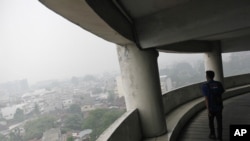Australia is to send a giant water-bombing aircraft and highly trained advisers to help Indonesia combat forest fires that have covered parts of SE Asia in a thick haze. The blazes are caused every year by firms clearing land for palm oil and pulp wood plantations, but the choking pollution from the fires this year is considered some of the worst on record. Indonesia has appealed for international help to contain outbreaks on Sumatra island and its territory on Borneo.
Capable of dumping 15,000 liters of water in one go, Australia’s firefighting aircraft known as Thor is expected to be battling outbreaks in Indonesia within days. Experts who specialize in extinguishing blazes from the air from the states of New South Wales and Victoria - two of the world’s most fire-prone regions - will also be sent.
An advance party of Australia officials arrived in the fire zone at the weekend to prepare for the arrival of the Lockheed Hercules Air Tanker.
Australia has been helping Indonesia tackle the menace of forest fires since the 1990s.
Shane Fitzsimmons, the commissioner for the New South Wales Rural Fire Service, is confident the current deployment will be successful given Australia’s past experience in fire emergencies in other countries.
“We have got a track record of demonstrating that whether it is providing assistance to our colleagues in Canada, North America or indeed places like Africa over recent decades that professionalism, that approach to national and international standards, I am confident will see us relatively seamlessly integrate into local operations over there notwithstanding the normal sorts of logistical challenges that you would expect,” said Fitzsimmons.
The challenges for fire crews will be immense as outbreaks on Sumatra island and Borneo continue to burn both above the ground and underneath the peat-rich soil.
The haze has made air quality dangerous in parts of Indonesia, Thailand, Singapore and Malaysia, leading to school closures, health warnings and billions of dollars in losses. The fires are also destroying peat lands that are one of the world's most effective carbon sinks, releasing large volumes of climate-changing gases. Greenpeace estimated the Indonesian fires alone could release more carbon dioxide than Britain this year.
Singapore and Malaysia are already helping fight the fires in Indonesia, which has also asked Japan and Russia for assistance.




